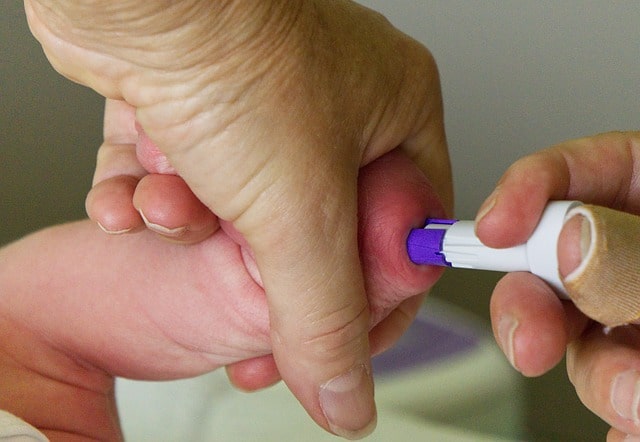
Blood sugar is also known as blood glucose, and it is the quantity of sugar present in the blood. Sugar is the chief source of fuel for the cells and tissues of the body.
It is synthesized from the carbohydrates whereas the sugar extent in blood is regulated by insulin. Low blood glucose is a clinical condition known as hypoglycemia. In the hypoglycemic state, the blood glucose levels become lower than the normal levels.
Low blood sugar levels may also arise in newborns. In medical terminology low blood sugar in newborns is called neonatal hypoglycemia. This condition can lead to severe health complications in newborns as well as adults. In the case of newborns, the infant’s body’s nutritional requirements for sugar is obtained from the lactose in milk.
The fluctuation of blood glucose levels is entirely possible particularly after the first few hours of birth. Some newborns are more susceptible to hypoglycemia depending upon various factors.
Signs and Symptoms
Newborns with low blood glucose might have no symptoms at all. In case an infant possesses any one of the risk factors that are associated with low blood sugar. The blood sugar will be checked at the hospital even if there are no signs and symptoms of hypoglycemia.
For the following clinical signs and symptoms, blood sugar test is a must:
- Pale skin
- Loose muscle
- Rapid or too slow breathing
- Irritability
- Poor feeding
- Tremors
- Seizures
- Vomiting after feeding
- Lack of energy
Causes
Neonatal hypoglycemia may occur when the infant’s blood glucose level is dropped below the normal levels or show the primary symptoms of low blood sugar. The newborns with one or more of the following risk factors are likely to develop hypoglycemia.
- An infant born early or having a severe infection
- Mother of the infant has diabetes
- High levels of insulin in infant’s blood
- Slow growth rate during pregnancy
- Born premature or abnormal size
Risk Factors
The following are several risk factors which increase the chances of developing hypoglycemia in newborns.
- Diabetic Mothers
- Mothers with medication such as terbutaline
- Small or large for gestational age
- Newborns with low birth weights
- Births under significant stress
Complications
Blood glucose is necessary for the proper functioning of the brain. Neonatal hypoglycemia can lead to severe health complications and often cause disturbance of mental function. Rarely, it can cause cardiac arrest or seizures. These complications are associated with low blood glucose.
Precautions
Hypoglycemia affects almost 15% of all babies. It is the preventable cause of brain damage in infants. It is essential that the newborns should undergo a blood test within the first few hours after birth.
The recommended method for blood test sample collection is heel prick. If the infant has a lower blood glucose level, then the infant can be treated with dextrose to return it to normal blood level.
In case of premature or abnormal size, the risk factor can be increased as well as a mother who has diabetes should maintain the normal blood sugar levels.
Prevention
In the majority of cases, it is almost impossible to prevent hypoglycemia in the newborn. A newborn with one or more risk factors requires more attention from health care providers. They will monitor the signs and symptoms to treat the infant.
Pregnant females with diabetes are suggested to control their blood glucose levels within the normal range. It will help to decrease the risk of developing hypoglycemia in their child.
Diagnosis
Newborns with clinical signs and symptoms or at risk for low blood sugar should be screened within a few hours after birth. After the diagnosis, the blood tests should be repeated until the newborn’s blood glucose level stays normal for at least 12 hours to 24 hours.
Other tests for newborn screening include metabolic disorder, hematological and biochemical tests.
Treatment
It is essential to take necessary steps to bring the blood glucose levels within the normal range. The newborn should be breastfed or fed with formula milk as soon as possible. The mild cases of hypoglycemia can be treated by feeding the newborn adequately.
If it is not possible to feed the newborn, then best choice administration of sugar solution intravenously. If the blood glucose level of the newborn is still below then the normal range. Maintaining skin-to-skin contact will also help.
If the blood sugar levels are still low, then medication can be given to stabilize the blood glucose levels.
Conclusion
It was a short overview of low blood sugar in newborns. If the hypoglycemic newborns are left untreated, it can lead to severe complications for the newborn’s physical and mental development.
The precautionary measures must be implemented, and treatment should be started immediately after diagnosis.
Extra care is required for females with diabetes, and every possible effort should be made to control the blood sugar during pregnancy. The fetus should get proper nourishment for better development.
Breastfeeding is highly essential for maintaining blood glucose level within the normal range.
References
- Rozance, P. J., & Hay, W. W. (2016). New approaches to management of neonatal hypoglycemia. Maternal health, neonatology and perinatology, 2(1), 3.
- Sternberg, J., Pfister, R. E., & Karam, O. (2017). Hypoglycemic relapse in term infants treated with glucose infusion. Journal of Clinical Neonatology, 6(3), 163.
- Füzéry, A. K., & Cembrowski, G. S. (2016). Requirements for Successful Adoption of a Glucose Measurement System Into a Hospital POC Program. Journal of diabetes science and technology, 10(4), 947-949.
- Mussa, A., Di Candia, S., Russo, S., Catania, S., De Pellegrin, M., Di Luzio, L., … & Milani, D. (2016). Recommendations of the Scientific Committee of the Italian Beckwith–Wiedemann Syndrome Association on the diagnosis, management and follow-up of the syndrome. European journal of medical genetics, 59(1), 52-64.
- Song, D., Mei, H., Zhang, Y., & Xin, C. (2017). Research on risk factors of neonatal hypoglycemia. Chinese Journal of Postgraduates of Medicine, 40(11), 989-992.
- Bennett, C., Headtke, E., & Rowe‐Telow, M. (2015). Use of Dextrose gel reverses neonatal hypoglycemia and decreases admissions to the NICU. Journal of Obstetric, Gynecologic, & Neonatal Nursing, 44(s1), S52-S53.
Image: pixabay.com




 Doctor Afzaal Ahmad is a Researcher, Microbiologist and Medical Writer. He is holding a Ph.D. degree in clinical microbiology and a Master’s degree in psychology. He is an associate member of American society for microbiology and Australian Red Cross Blood Service.
Doctor Afzaal Ahmad is a Researcher, Microbiologist and Medical Writer. He is holding a Ph.D. degree in clinical microbiology and a Master’s degree in psychology. He is an associate member of American society for microbiology and Australian Red Cross Blood Service.